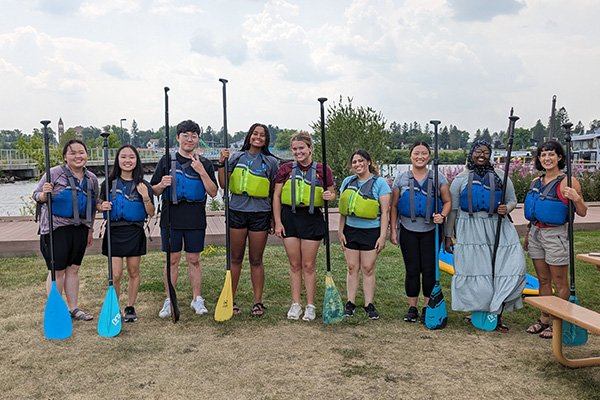“Being Equipped for My Excellence” completes inaugural year
August 6, 2024
Erin Wilson

The College of Pharmacy’s BE ME (Being Equipped for My Excellence) program just wrapped up its pilot year, during which students from underrepresented backgrounds received mentorship, support sessions, and more. Amongst their inaugural cohort of eight students, who are now preparing for their second year of pharmacy school, 100% rated their experience exceptional and effective at providing a welcoming entrance to the college. Now, the initiative is collecting more detailed student feedback, assessing impact, and preparing for the second cohort of students.
Dr. L'Aurelle Johnson, director of diversity, equity, and inclusion and associate professor in the Department of Experimental and Clinical Pharmacology (ECP) in the college, is the faculty lead for the program. She said one of the standout elements of the initiative is that it challenged the members to step out of their comfort zone– for example, encouraging students who typically identify as introverts to run for leadership positions.
“I think we saw a tremendous amount of growth amongst individuals as they challenged themselves... and they liked it,” Johnson said. “They built up confidence; at the beginning, they're a little nervous, facing a bit of impostor syndrome in a new environment, but I think we saw the students blossom throughout the year.”
BE ME also emphasizes the importance of asking for help and making use of the many resources available to students.
“One of the things that we want to really reiterate within this cohort is that…asking for help does not mean that you’re deficient in anything; everybody is seeking out that help and one of the things that challenges underrepresented or minority groups is that lack of asking for help when they need it or utilizing resources,” Johnson said. “Those resources help them get to their goal and see that there isn't a negative stigma around utilizing those – they're available for you to thrive, to achieve.”
The year-long program began with a two-week-long immersion, which focused on building social capital networks and fostering a sense of belonging in the college – two pieces Johnson said determine success in the first year of any academic program. Students then experienced four longitudinal sessions, a self-efficacy assessment, and a final capstone project on the importance of building social capital and networks across different areas of life.
In an exit survey, several students expressed gratitude for the way BE ME helped them acclimate to the pharmacy school, make friends, and meet mentors.
“My first year of pharmacy school was an insightful and rewarding year. I felt supported by faculty and peers,” one student wrote. “I could communicate my thoughts and was encouraged to express my point of view. By the end of the year, I did feel like I belonged as a CoP student.
As they await more feedback from the students, Johnson said some adjustments are already in progress for the upcoming academic year. They will increase the amount of contact between students and ambassadors, integrate more assessments to monitor progress, and shorten the length of immersion days and cohort meetings to allow students to first acclimate to their new environment and accommodate the rigor of the pharmacy program.
“We're covering the same concepts [and] ideologies that we fostered in the first immersion experience, providing connection points and we're also going to take into consideration some of the comments on the survey,” Johnson said. “We have a better handle on [scheduling], especially planning opportunities in which [the students] are free because of the curriculum. We didn't really know at the time because it was based upon the legacy programs (CI-1).”
BE ME had to navigate the transition to the college’s new MNspire curriculum; since ambassadors for this very first cohort were taught the CI-1 curriculum, Johnson said they geared sessions instead toward studying skills and forming study groups. After cohort members completed their first MNspire semester, BE ME checked in about lessons learned and what the students could improve upon so that they could help provide the tools to achieve that in the next semester.
This year’s cohort will now have the opportunity to volunteer as ambassadors for next year’s recruits and will still be invited to participate in parts of the program throughout their time in pharmacy school.
“It's really leveraging the knowledge and the learning of the previous cohort and being able to share. So I think this second cohort will benefit much more because they can have a cohort that has gone through it before,” Johnson said.
Looking to the future, Johnson said BE ME will work on recruiting more faculty and staff to participate and deepening the college’s investment in the program.
“I think once you develop that rapport with faculty and staff you become more comfortable in the pursuit of your education…What’s next for the program is really getting participation from all faculty and staff who have a unique perspective to bring to the program…I think it can expand the commitment from the college toward them being successful,” Johnson said. “We want everybody to be invested in this program.”
Finally, Johnson said her reasoning behind leading this program lies in helping marginalized students build a toolkit for conquering any barriers they will face.
“How are you going to get strategies to still achieve your goal in spite of these barriers? No, it's not fair. No, it's not equitable…I think this program is really the way— it's called Being Equipped for My Excellence; it’s a personalized approach to giving you the tools to navigate,” Johnson said. “They're going to be important in the real world and if you can navigate this environment, you should have the tools to navigate your personal career.”
The BE ME program is made possible through the support of a grant from the McKesson Foundation.